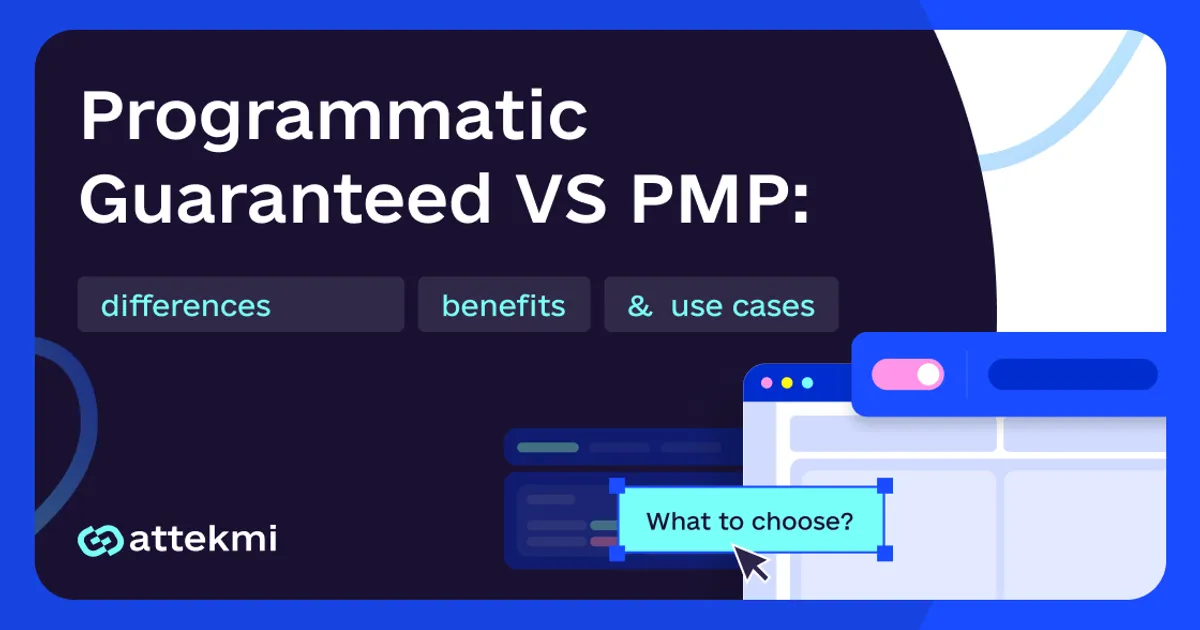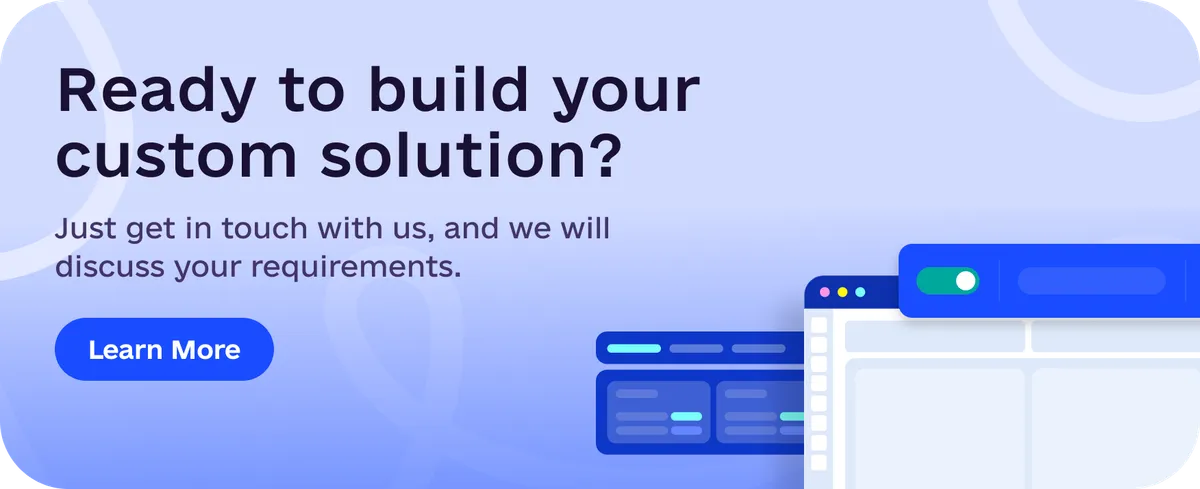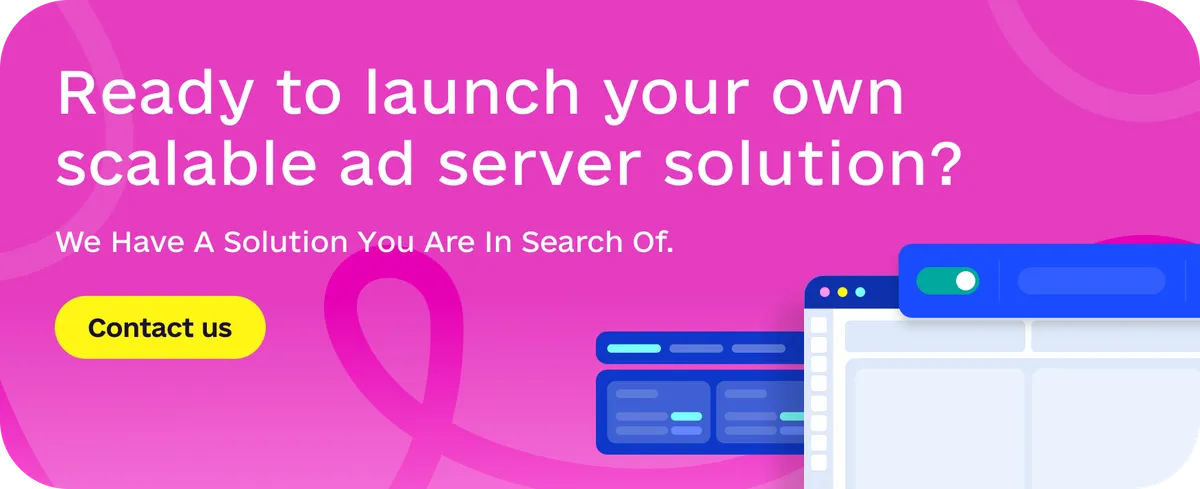Programmatic technology offers multiple opportunities to advertisers, and they are not limited to standard real-time and header-bidding auctions. Marketers striving for greater control over their operations, as well as for access to exclusive ad inventory, often switch to alternative options like private marketplaces (PMPs) or programmatic guaranteed deals.
However, to make the right choice, you should understand all the differences between PMP vs programmatic guaranteed.
Operating in the AdTech industry since 2018, we know everything about different programmatic buying models – our ad exchange solutions support diverse types of integrations. Therefore, we prepared a guide to help you grasp all the nuances of PMP and programmatic guaranteed advertising. Read on to discover how these models can enhance your strategy and what things you should keep in mind.
Key Takeaways:
Programmatic guaranteed is a perfect model in case you need to launch your campaign on a specific media source and at a certain time.
Access to premium ad inventory is one of the key benefits of private marketplaces.
Both programmatic guaranteed and PMP allow you to enhance your brand safety.
Unlike programmatic guaranteed deals, PMPs offer flexibility due to their auction-based nature.
What is programmatic guaranteed?
The programmatic guaranteed approach implies direct negotiations between an advertiser and a publisher, and bypassing classic auctions. You discuss all the details with the media owner, such as the number of impressions, specific ad placements, price, and others. Then, after everything is approved, the deal is guaranteed for both parties involved. You, as a marketer, must pay, while a publisher has to provide the required number of impressions. At the same time, the process involves a certain automation aspect, so there is no need to do everything manually.
Pros and cons of programmatic guaranteed
Programmatic guaranteed offers an entire range of benefits for advertisers; however, there are still some disadvantages to pay attention to.
Benefits of programmatic guaranteed
Let’s review the pros first:
Enhanced brand safety: You know exactly where your ads will appear, which means that you can easily avoid low-quality or potentially unsafe websites and apps.
Improved targeting: You know who will see your ads, which makes it easier for you to reach those users who are most likely to get interested in your products or services and convert.
Secured ad space: There is no need to worry that you will not win the auction. After everything is negotiated, the deal is completed according to the agreed conditions.
Predictable expenses: The price is fixed, so you clearly know how much you will pay.
Reduced risk of fraud: Due to the absence of intermediaries and enhanced transparency, the probability of fraud is decreased.
An opportunity to build long-lasting relationships with publishers: This is a benefit both for you and media owners.
For publishers, programmatic guaranteed is beneficial as well, since they know what ads will appear on their sources and can forecast their income. By the way, here are some effective strategies for traffic monetization. Make sure to check them out if you are a media owner.
Drawbacks of programmatic guaranteed
As for the disadvantages, here they are:
The process of identifying the right publishers and negotiating the deals may be rather time-consuming.
Programmatic guaranteed lacks flexibility, as you cannot adjust your campaigns in real time and are obliged to pay after everything is agreed. Apart from private marketplaces, you may want to consider programmatic preferred deals as an alternative.
Programmatic guaranteed deals often have higher CPMs.
What is a private marketplace (PMP)?
PMP is a private marketplace where publishers offer their inventory to selected advertisers. It operates on an invitation-only basis and provides an opportunity to access premium inventory. Such a marketplace leverages programmatic technology for real-time bidding, but still requires some communication and manual work for the initial setup.
Pros and cons of private marketplaces (PMPs)
Just like any other type of programmatic buying, PMPs have both advantages and disadvantages.
Benefits of private marketplaces
The key benefits are as follows:
Access to top inventory: Such ad placements may not be available on open auctions.
More accurate targeting: You can leverage publishers’ audience insights. Even though the accuracy level may vary, targeting is still more precise than in the case of open auctions.
Improved brand safety: Thanks to the exclusive nature of media sources, you do not have to worry that your ads will appear within an unsafe context.
Reduced risk of fraud: On top-performing websites that usually join PMPs, the probability of fraudulent activities is lower.
In turn, for publishers, the main benefit is increased control over the inventory selling process. Since advertisers require an invitation, media owners can be sure that their website visitors or app users will see high-quality ads.
Drawbacks of private marketplaces
And here come the disadvantages:
In comparison with open exchanges, PMPs may offer rather limited reach, which makes it challenging to reach new audiences and scale the campaigns.
Since some manual work is involved and getting an invitation is required, launching a campaign may take time.
The costs can be higher, and there is no guarantee that you will get the desired ad placement.
Programmatic guaranteed vs. PMP: key differences
So, programmatic guaranteed vs PMP. Let’s explore the main differences so that it will be easier for you to choose the most effective model for your campaigns.
Programmatic Guaranteed | Private Marketplaces (PMPs) | |
Is real-time bidding involved? | No | Yes |
Are impressions guaranteed? | Yes | No |
Is manual work involved? | Yes, you must negotiate all the details with a publisher | Yes, but less than in the case of programmatic guaranteed |
Is the price fixed? | Yes | No |
What inventory is available? | All types, including premium | Premium |
What is the level of control? | High | Medium, as you still take part in an auction |
Is targeting accurate? | Highly accurate | May vary, but still more precise than in open auctions |
What is the level of transparency? | High | Medium, as an auction is still involved |
You may also want to learn more about the differences between native vs display ads.
When to use programmatic guaranteed: best scenarios & use cases
Now that the key differences between PMP vs PG deals are clarified, let’s define the situations when programmatic guaranteed can be the best option for your campaigns:
When you are able to define the most relevant and top-performing publishers. Usually, this requires taking part in standard open auctions for some time. Then, by analyzing the campaign performance thoroughly, you may be able to identify media owners who bring the best results and initiate negotiations with them.
When you want to secure ad placements on specific sources.
When you strive for greater brand safety and transparency, and do not require flexibility.
When you need to reach your audience during a specific time (for instance, right after your new product is released).
When you need to target a specific audience and require a certain number of impressions.
Imagine the following scenario: you need to launch a campaign a couple of weeks before Black Friday. However, during this time, ad inventory can be scarce due to increased demand and high competition. Many advertisers start promoting their products in advance, so it can be very difficult to purchase ad space in open auctions. In turn, with programmatic guaranteed deals, you can secure relevant ad space and reach your target audience in the required time frame. Nevertheless, remember that negotiations should be started beforehand.
When to use a private marketplace (PMP): best scenarios & advantages
As for a private marketplace, here are the conditions that can motivate you to choose this option:
When you need to target a specific audience and require premium inventory.
When you strive for impressions of higher quality.
When you do not require ultimate scalability, but aim for lower competition for ad inventory.
When you require flexibility in terms of pricing and campaign optimization possibilities.
When you are not limited to specific time frames.
Here is an example: your brand sells luxury goods, and you want your ads to appear on premium websites. However, it can be difficult to purchase such placements via open auctions even if you apply advanced targeting and filtering settings. Besides, you are not ready for guaranteed deals yet since all the media sources you reach deliver more or less the same results. In this case, joining a private marketplace can be the right choice since you will get an opportunity to access high-quality inventory, while the competition will be lower.
In addition, both programmatic guaranteed and PMP enable you to reduce the risk of ad fraud. At the same time, you should remember that minimizing fraudulent activities requires an all-encompassing approach – just switching, for instance, to programmatic guaranteed deals is not enough.
Programmatic guaranteed and PMP: can you use both?
Should you choose programmatic guaranteed or PMP advertising? Everything depends on your goals and requirements. However, you do not have to stick to a single programmatic advertising model. You can combine different options to optimize your strategy and reach the best results.
For instance, you may compete for ad inventory in PMPs to ensure flexibility and real-time adjustments. Additionally, from time to time, you can go for direct deals to secure ad placements for the required periods of time and on specific websites. Yes, programmatic guaranteed and private marketplaces serve different goals, but you can still use them simultaneously, as well as combine them with other options like, for instance, preferred deals.
Keep in mind that regardless of the chosen approach, you must monitor the performance of your campaigns continuously. This way, you will be able to detect weaknesses and opportunities on time and fine-tune your strategy accordingly.
One more thing to mention is that getting your own ad exchange solution is a way to gain greater control over your advertising processes, as you will be able to match your demand-side platform with the most relevant supply. Besides, you will have an opportunity to earn from media trading.
Why choose Attekmi for your programmatic advertising strategy?
At Attekmi, we offer a selection of ad exchange solutions that is able to meet any requirements:
AdEx Basic: An entry-level platform with basic functionalities, a perfect choice for those only entering the industry.
AdEx Plus: An enhanced version of AdEx Basic. A platform for businesses looking for additional capabilities and certain scalability opportunities.
AdEx Enterprise: A solution with advanced functionality and an ultimately scalable nature – for businesses that require all Attekmi’s features. What is AdEx Enterprise in detail? Follow the provided link to discover all the benefits.
White Label Ad Exchange: A fully customizable platform, from UI personalization to custom on-request feature development. For companies that want to enter the market on their own terms.
With our solution, BidderMob achieved 319% ROI and upscaled the platform to 100k QPS.
Being your trusted partner in any AdTech matter, we also offer a range of services:
Custom AdTech development: We are here to bring your unique project to life.
Ad Ops outstaffing: We can train an expert specifically for your business so that you can focus on your core tasks while your operations run smoothly.
AdTech and Ad Ops training: We are ready to help you enhance your skills and gain new knowledge.
Operating in the industry since 2018, we have helped over 150 partners grow their businesses. Explore our case studies to learn more.
Does Attekmi look like the right choice? Reach out to us, and we will help your business reach new heights.
FAQ
Both programmatic guaranteed and PMP advertising offer a variety of formats, including display, video, native, and other options. However, the available formats depend on the publisher. For instance, one media owner may offer only native ads, while another one – the full range of options. Make sure to discuss this with your potential publisher.
Generally, it is possible, as most demand-side platforms offer multiple programmatic buying models. However, everything depends on your specific solution. If you are still searching for the right DSP, prefer the one that supports both PMP and direct deals in addition to open auctions.
Consider your objectives and requirements. For instance, if you are choosing between PG vs PMP (programmatic guaranteed vs a private marketplace) and need some flexibility, PMP deals are the right choice. In case you need to launch your campaign on a specific website at a certain time, programmatic guaranteed is the most suitable option
 By Iryna Kozirevych
By Iryna Kozirevych

